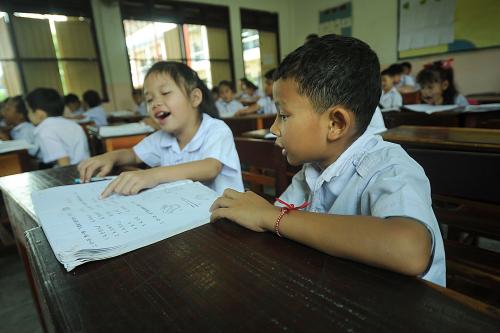Part I of this series on costing and financing reviewed over a decade of work on costing and financing at the Center for Universal Education (CUE). Beginning in 2011 with research into corporate philanthropy, the workstream has grown to now encompass the Childhood Cost Data initiative—with the accompanying Childhood Cost Calculator (C3)—as well as leading work on outcomes-based financing. Reflecting upon the long and significant history of this work also highlighted the power of collaboration in making progress in the sector. The second part of this series turns the focus to external initiatives on costing (cost analysis) and/or financing, with the aim of spotlighting progress in the sector, pinpointing ongoing challenges, and finding potential avenues of cooperation and collaboration for future work at Brookings as well as the sector at large. In addition, this review of the landscape will help to set priorities jointly with the soon-to-be-launched Global Costing Task Force and the CUE Global Costing Labs, which use the C3 to strengthen capacity and increase the volume, quality and use of cost data across the globe.
In the initial phase of mapping, desk research aimed to identify all existing, recent (within the last 5 years), or expected initiatives that focus on costing and/or financing global education and early childhood development (ECD) in low- and middle-income countries (LMICs). Inclusion and exclusion criteria enabled a paring down of initiatives to those that were global in nature, focused at least in part on LMICs, not exclusively focused on either higher or medical/health care education, and not existing solely as a funding/financing agency or instrument. After these parameters were set, a list of key search terms and specific questions and data points of interest were determined, which further refined the scope of the project.
Research findings
The initial research identified 18 initiatives that met the above criteria, including two solely focused on early childhood education/development. These initiatives can be broken down into three categories: costing-focused (7), financing-focused (7, including one upcoming initiative), and costing and financing—or hybrid—focused (4). These initiatives engage in varied activities, including advocating for consideration of costs or finance-related aspects (such as better budgeting, good governance, or more transparency); providing sector-wide guidance, learnings, research products, or case studies; creating avenues for sharing and learning like working groups or eLearning courses; developing methodologies and tools; and other activities summarized in the charts below.
|
Work includes |
|||||||
|
Initiative |
Organization (if separate) |
Specifically includes ECD in work |
General advocacy |
General guidance/learnings |
Case studies/cost analysis/evaluation |
Methodology |
Tool development/ownership |
|
Airbel Impact Lab |
International Rescue Committee |
X |
X |
X |
X |
||
|
Building Evidence in Education (BE2) |
FCDO, World Bank, USAID, UN |
X |
|||||
|
EdTech Hub |
Consortium of organizations |
X |
X |
||||
|
Impact at Scale Labs |
Global Schools Forum |
X |
X |
X |
|||
|
Systematic Cost Analysis Consortium |
X |
X |
|||||
|
What Works Hub for Global Education |
|||||||
|
Center for Benefit-Cost Studies of Education |
University of Pennsylvania Graduate School of Education |
X |
X |
X |
X |
||
|
Work includes |
||||||||
|
Initiative |
Organization (if separate) |
Specifically includes ECD in work |
General advocacy |
General guidance/learnings |
Case studies |
Research products |
Working group/network |
Implementation |
|
CATALYZE Education |
USAID, Palladium |
X |
X |
X |
||||
|
Global Campaign for Education |
X |
X |
X |
|||||
|
IFE and IFE-2-Leave No One Behind |
NORRAG |
X |
X |
X |
X |
X |
||
|
Collective Learning Initiative: Outcomes-Based Financing for Early Childhood Care and Education |
NORRAG, Education Outcomes Fund (EOF), Government Outcomes Lab (GO Lab), Ecorys |
X |
X |
X |
X |
X |
||
|
The Education Commission |
X |
X |
||||||
|
Education Finance Network |
Dalberg, Opportunity International, EOF |
X |
X |
X |
||||
|
Financing Observatory |
Education Cannot Wait |
Upcoming initiative |
||||||
|
Work includes |
|||||||||
|
Initiative |
Organization (if separate) |
Specifically includes ECD in work |
General advocacy |
General guidance/learnings |
Research products |
Tool development/ownership |
Tool comparison |
Repository of external resources |
Policy dialog |
|
Task Force on Education Management and Policy Support and Financing and Education Working Group |
Association for the Development of Education in Africa |
X |
X |
X |
X |
||||
|
Better Early Learning and Development at Scale (BELDS) ECE Accelerator |
UNICEF, GPE, and partners |
X |
X |
||||||
|
Early Childhood Development Action Network (ECDAN) |
X |
X |
X |
X |
X |
||||
|
International Institute for Educational Planning |
UNESCO |
X |
X |
||||||
An analysis conducted on how central costing and/or financing is to each initiative’s focus found that there is a wide range in how central these two topics are to the overall focus of each initiative. On the whole, financing initiatives tend to be more exclusively focused on financing. Four of the seven initiatives focus solely on financing in education, and it is likely that the upcoming Financing Observatory will also do the same. Costing initiatives run the gamut from those that focus solely on costing to those that include costing as a small aspect of their work, with minimal outputs. Many of the initiatives touch upon costing within the context of another topic. The hybrid initiatives tend to have the least focus on our topics of interest, with most including costing and financing as just one (or two) thematic area(s) among many within a broader mission.
Our experience working in both the costing and financing spaces generally aligns with these observations. While financing is a hot topic, especially in regard to the annual financing gap to achieve Sustainable Development Goal 4, costing is not nearly as prevalent in discussion or even in evaluations and empirical studies of education programs. This is in part due to the many barriers to collecting and using high-quality cost data. Initiatives focusing on financing in education are robust and have, by and large, moved beyond making a case for themselves. On the other hand, costing initiatives are generally not standalone programs and often exist within larger initiatives, with some existing within an even larger organization. There is a pressing need to make well-informed decisions regarding which education initiatives are piloted, altered, scaled, or discontinued in under-resourced contexts, yet costing initiatives within the sector are not nearly as robust as those focusing on financing. The need to make well-informed decisions is perhaps even more true in ECD, which UNESCO finds suffers from “insufficient political, social, and financial commitment” at the “global, regional, national and sub-national levels” and which is poorly represented among the identified initiatives in our initial mapping.
Conclusion
This mapping project underscores the work being done by the sector in relation to financing and highlights the ongoing need for more substantial efforts to be made around costing and extending work to include ECD specifically. In addition, it brings to the forefront which players are involved, what links to government already exist, and what gaps persist. The work CUE does is one piece of the puzzle attempting to address the outsized goal of increasing the volume and improving the efficiency and effectiveness of education financing. Each of these initiatives represents another component of the puzzle, but there is still much work to be done. Both a lack of data and the capacity to use said data persist and continue to hold the sector back from making progress toward SDG 4. Gains will require collaboration, yet many of these initiatives are siloed or disconnected from others. In many cases, these initiatives exist as smaller components of a larger center or organization, and some may not have publicly accessible coverage of their mission and activities. This not only leads to missed opportunities to work in partnership to achieve our common goals but can also lead to duplication of efforts, wasting already constrained resources and time. To ensure the capture of initiatives that might have been missed in the research, readers are welcome to contribute information about initiatives (current, in the past five years, or coming in the next year) working on costing and/or financing in global education and ECD through this survey.
The Brookings Institution is committed to quality, independence, and impact.
We are supported by a diverse array of funders. In line with our values and policies, each Brookings publication represents the sole views of its author(s).








Commentary
Taking stock, part 2: Mapping global education and early childhood costing and financing initiatives
April 17, 2025